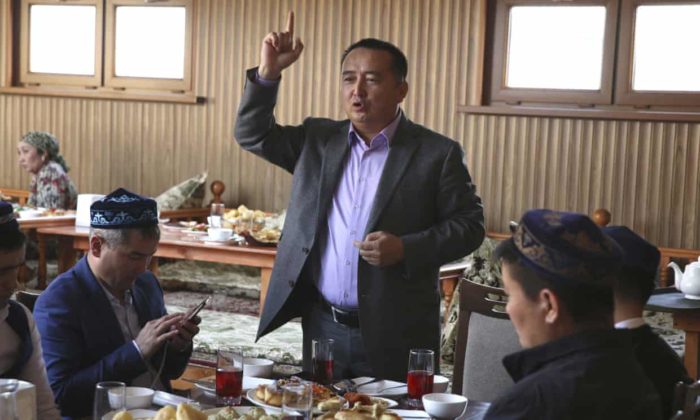The Guardian view on Xinjiang’s detention camps: not just China’s shame

The Guardian, 17 March 2019
 By Editorial – An “A-list” comedian, well-known singers, scholars, pensioners and civil servants – the list of prisoners grows. As many as 1.5 million Uighurs and other Muslims are or have been held in camps in China’s Xinjiang region without charge or trial, a leading researcher believes. Virtually no Uighur family is untouched, he says.
By Editorial – An “A-list” comedian, well-known singers, scholars, pensioners and civil servants – the list of prisoners grows. As many as 1.5 million Uighurs and other Muslims are or have been held in camps in China’s Xinjiang region without charge or trial, a leading researcher believes. Virtually no Uighur family is untouched, he says.
China has moved from denying the camps to describing them as vocational training centres, comparable to boarding schools. In the run-up to last week’s meeting of the UN human rights council in Geneva, it invited diplomats from selected countries on tours and choreographed visits for a few journalists, who were greeted with people singing If You’re Happy and You Know It, Clap Your Hands. According to Beijing, these are students receiving free accommodation, skills training, and lessons in Chinese language and law.
This doesn’t explain the barbed wire, the purchases of stun guns or the accounts of political indoctrination, punishment for speaking anything but Mandarin, harsh conditions, and abuses amounting in some cases to torture. People have reportedly been detained for having verses from the Qur’an on their phone or family members abroad. There are suggestions that more inmates are now leaving the camps, but perhaps for house arrest or forced labour. Meanwhile, all-encompassing surveillance and intense repression envelop the region.
Beijing believes these measures are needed to curb the violence that has plagued Xinjiang – and that they are working. A Chinese official in Geneva said that thanks to the training centres, there had not been a single terrorist attack in more than two years. In Beijing, the region’s governor – its most senior Uighur official – suggested that numbers are likely to dwindle and that the centres will disappear “if one day our society doesn’t need them”. Few Uighurs take comfort from those words. Relatives overseas, who once feared that speaking out would worsen the plight of prisoners, have concluded they have little choice but to go public. They have found little support.
Serikjan Bilash, a prominent Uighur exile and campaigner in Kazakhstan, was recently detained; supporters blame pressure from Beijing. Muslim-majority countries have been strikingly silent about the camps, though Turkey recently criticised them as “a great cause of shame for humanity”, and Malaysia refused to return 11 Uighurs in its custody; Anwar Ibrahim, in line to be the next prime minister, has also spoken out. Yet, staggeringly, the Organisation of Islamic Cooperation, whose 57 members include Turkey and Malaysia, has just commended Beijing’s efforts “in providing care to its Muslim citizens”: not bleak humour but testament to China’s growing political and economic power.
True, the US has stepped up criticism, saying it would consider targeted measures against individuals responsible for rights violations. Britain was among a few western nations in Geneva calling for immediate release of those detained without due process, and urging that the UN is given access – as its rights chief, Michelle Bachelet, has repeatedly requested. These demands should be made much more loudly, and far more broadly. The camps are China’s shame; the indifference is the world’s.

